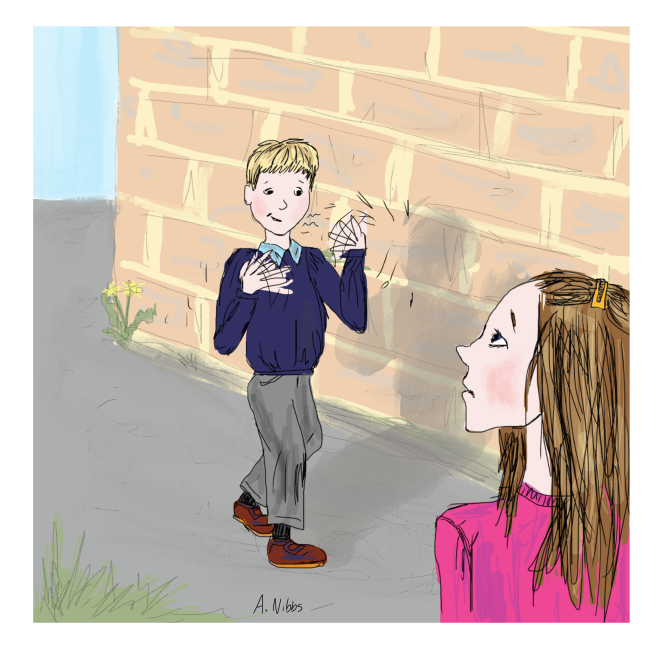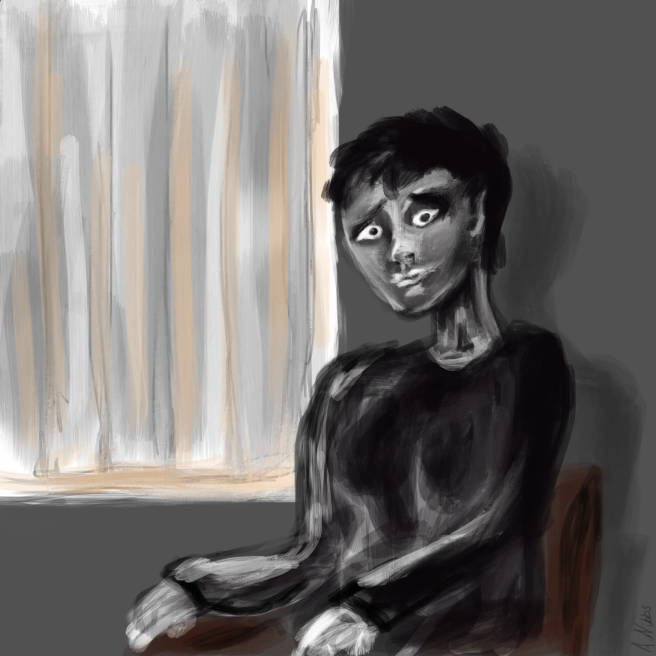Have you ever watched a spider spin its web? I mean, not just watching a speeded-up playback of a time lapse recording on the telly, but actually sat or stood in front of a real spider spinning its web in real time before your eyes?
This afternoon for the first time I did exactly this.
In recent weeks, I’ve been coming to the increasingly clear conclusion that I have, for a long time, been suffering from a certain degree of complex post-traumatic stress disorder (C-PTSD). This isn’t something I’ve randomly decided, and it’s not something I’m plucking out of the air. There have been discussions going on in the adult autistic online world, and much of this resonates with me.
I’ve struggled for some time to write any new posts for this blog. I seem to be in a constant state of exhaustion. I haven’t had the energy, time, or emotional wherewithal to write much in the way of new content – whether whimsical, creative, exploratory musings, or intelligently- and expertly-crafted essays.
I haven’t had the battery power for advocacy, politics, or any form of campaigning on behalf of myself or of any other autistics through my writing. I’m barely keeping my head above water sufficiently to do my job, or be an effective parent.
But my recent “vignettes“ posts seem to be coming out of nowhere. Painful memories have been coming to the fore as a result of chance conversations and certain word combinations I have read or heard online, or they’ve revealed themselves as the landscape and landmarks surrounding some of the stops, halts, or termini on the journey taken by my train of thought.
They’re flashbacks.
They’re vivid.
And while I can’t get rid of them entirely, by capturing them in writing, I’m taming them, before releasing them into the wider world in a controlled fashion, their custody no longer solely my responsibility.
I know there will be plenty more of them.
I’m increasingly realising that I have been traumatised. Not by a sudden, catastrophic event. My trauma is cumulative. It is the trauma of countless small painful experiences. Emotional pain. Intellectual pain. Social pain. Sensory pain. Some of that pain has been of a primarily physical nature; sometimes, the effects upon me of other forms of pain have themselves been physical.
Some of that pain has been inflicted upon me by other people – both prior to and since my autism diagnosis. Some of those who inflicted that pain were fully aware I was autistic, many weren’t. A lot of pain has been (and still is) self-inflicted – I’ve learnt to expect negative interactions with others, or problematic interpretations of my behaviour, actions, and modes of communication. I’ve learnt to assume that I’m the one in the wrong even when I know that, objectively speaking, that isn’t the case. And I beat myself up about it.
Today was a team away day. It was a far more positive experience for me than the event which formed the subject matter of a recent work vignette. The afternoon discussions were practical, and produced some tangible results that might actually help to shape the services we deliver and give us some concrete objectives.
From an accessibility point of you, everything had been handled pretty well. The venue wasn’t sensorily objectionable. I, and a fellow autistic working in our section, had received plenty of advance information about the structure of the event, and details on the format of specific activities. I didn’t feel remotely uncomfortable about ducking out of conversations during the breaks and sitting in a corner with my headphones on, or taking myself outside for a breather.
But the first exercise of the day felt problematic for me – we were each asked to pick a shape that we felt most closely represented who we were as individuals. Having looked at the material beforehand, I had already made up my mind that I was a “squiggle“. There were a fair few of us squiggles, including a not-insignificant number of neurodivergent folks in the room.
I associated the squiggly line with dynamism, energy, creativity, exploration, lateral thinking, and a busy, active mind. Boxes are too rigid; circles have some appeal to me, with their lack of endpoint, their sense of unity, continuity, inclusiveness, and something of the holistic. I don’t see myself as a pointy triangle or a rectangle.
We were asked, in individuals then groups, to note down words associated with each of the shapes – the ones we most strongly identified with, our second choices, and those with which we identified the least strongly.
Whilst it was meant to be a harmless, lighthearted, not particularly scientific activity to provoke discussion about team dynamics, and help us think about the characteristics of some of the people we work with, I couldn’t help feeling triggered by some of the more negative words and phrases that a few “non-squiggle” colleagues associated with my shape.
Flaky
Out of control.
Messy.
Doesn’t plan anything – or struggles to stick to plans.
Unpredictable.
There was hostility towards some of the other shapes as well – the “box/square” came in for a fair bit of criticism.
But whilst it was not intended that we read too much into this, I was reminded of all the times when people have levelled criticism at me without fully understanding me. I’ve been told I was out of control, that I can’t multitask, that I’m disruptive. I’ve called myself “stupid” and “lazy” because I procrastinate, have difficulty planning and organising, and difficulty seeing things through – often because too many other ideas are crowding my consciousness, vying for my attention, but also, frequently, because I simply can’t make my brain “do the thing”.
I’ve been criticised, and often criticised myself, simply for being the way I am in a world in which my way of being isn’t the majority modus operandi.
When all the time, I’m having to negotiate far more just than the explicit task at hand. I am, in fact, multitasking by default, because – as a disabled person and an autistic person – I am simultaneously performing so many extra “jobs“ on top of the one that I’m paid to do. I don’t always have the energy to perform that job well as well as I’d like, because my energy is being expended elsewhere in a way that those who do not share my neurotype couldn’t possibly imagine.
And as a perfectionist, that sucks. I like doing things well.
So recently, I’ve been going through a bit of an “I hate my brain“ period. I’ve been resentful of the fact that I’m a polymath, with a constant explosion of ideas taking place in my brain, but little ability to focus on one project, activity, or idea to execute well, and little time or energy to devote to these passions.
It’s not really the right time to chase my dreams – my children are still very young, both are neurodivergent and need a lot of input. I’m still getting to grips with new job and a new work environment. Various members of my family, and I myself, are experiencing a fair few health challenges.
Which means I find myself resenting the ideas that come to me. I can’t actually do anything with them, but I don’t have the patience to leave them be, or make a note of them to pursue at a future time when I’m more sufficiently resourced to do so.
After the away day, I was tired. So much listening. So much processing. So little rest. But as the working day finished earlier than usual, I decided not to go on a long wild walk, but instead to take my usual route home through several of the local parks but do so more slowly, more mindfully.
Rather than feeling the compulsion to experience the expansive, the large-scale, the landscape at macro-level (as is often the case when I chose to take myself outdoors to shake off my overwhelm), I was compelled to examine the outdoors in miniature.
I stood watching bees pollinating flowering bushes and shrubs. I was fascinated to note that certain types of bee preferred certain plants. I appreciated, for perhaps the first time, the what-should-be-damned-obvious fact that bumblebees (being insects) have bodies (like all other insects) that are articulated into three distinct sections rather than being a somewhat indistinct ball of fuzz with a head, legs and wings.
Closer to home I spotted a ladybird perched atop a valerian stem. I noticed its mouthparts, antennae, the articulation of its six limbs, its individual pattern of spots, and the smaller segmentation of its thorax, visible briefly on the underside of its body as it clambered over a leaf stem, beneath the modified wings that were its scarlet, polka dotted shell.
And then I saw the spider.
A garden spider, minutely patterned in greys, beiges and taupes. A particularly tiny example of the species.
It had just begun to construct a web between several valerian stems. The radial threads were already in place, and at the point I started to observe the tiny creature, it was in the process of strengthening the centre. As I watched, it finished this stage, before constructing a few non-sticky spiral threads to allow it to scamper to the outer reaches of the structure, before spiralling inwards with the final, sticky silk that would form the completed web.
The threads were so fine they were barely visible without holding my head at a tilt.
I had never before appreciated the meticulous complexity, or the beauty, of the web-spinning process itself.
In watching the story of the web’s construction unfolding before my eyes, I slowed down. I relaxed. I smiled. I took solace in nature doing its thing. Solace in the spider’s web.
And I appreciated my brain again. Appreciated my love of detail. My love of close-up examination that is just as strong as my love of patterns, connections and the bigger picture. My ability to enjoy such things without having to quantify them, or question whether or not I should be spending my time enjoying them.
I felt restored.
*I have Anna Nicholson of Transponderings to thank for the idea of ‘unposts’ – it’s useful sometimes to be able to post a set of uncategorised, stream-of-consciousness musings. I’ve recognised the need to be able to write without necessarily putting pressure on myself to come up with something polished.
Anna – I hope you don’t mind me pilfering this approach! ☺️




